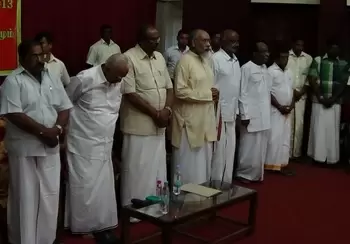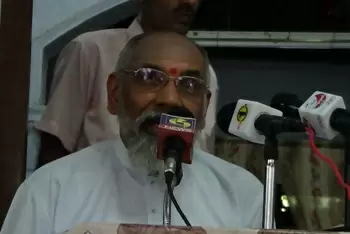TNA’s inclination to by-pass Tamil Nadu is engineered by New Delhi

20-September-2013
Vol 4 | Issue 38
It is expected that the Tamil National Alliance (TNA) will win the Provincial Council Elections under the thirteenth amendment to be held on 21 September.
There are those who will argue that such a victory will demonstrate the Tamil people’s steadfast support for the principle of self-determination. This is because TNA has cleverly incorporated its commitment to self-determination in its election manifesto, notwithstanding that the thirteenth amendment has virtually robbed the Tamils of this right.
 |
|
TNA wants to please New Delhi, not realizing the latter’s deeper motives (Photos Courtesy: Global Tamil News)
|
Instead, the consequence of a victory by the TNA has the potential to undermine the interests of Eelam Tamils.
Firstly, it can trap the Tamils into an arrangement where the ultimate political power resides with Colombo. The thirteenth amendment provides veto powers to the governor who is an appointee of the President.
Secondly, a TNA victory has the potential to silence Tamil Nadu by giving a false impression that the Tamil demand for self-rule has been met by electing a TNA led Northern Provincial Council. Indeed, by asking Tamil Nadu to keep out, Justice Wigneswaran, the TNA’s Chief Minister- in- waiting has sought to provide New Delhi a free hand to deal with Colombo.
Although Wigneswaran has later claimed to have been misquoted, there are grounds to regard this as a deliberate and well thought out pronouncement delivered at the behest of New Delhi.
Thirdly, elections held under the thirteenth amendment will legitimise the Indo-Sri Lanka accord. By implementing it in respect to the Northern Province, Colombo can be seen as endorsing the Accord.
If a TNA victory is interpreted by Tamil Nadu as having met the Eelam Tamil demand for self-rule, New Delhi unfettered by Tamil Nadu will seek to further its own interests, which is to bring Colombo within its orbit.
It will have the strategic space to pursue its actions by seeking to implement the Indo-Sri Lanka Accord and in that process negate the Chinese presence. Should Colombo resist, New Delhi will have international law on its side in the form of the Indo Sri Lanka Accord to intervene and bring about a regime change if necessary.
The new Pro-New Delhi regime in Colombo will of course have the advantage of a powerless Northern Provincial Council which it can further disempower if it chooses to, without any objections from New Delhi.
TNA’s actions to-date demonstrate that it operates under the illusion that relying on New Delhi is the only way to obtain concessions from Colombo. The TNA appears blind to the fact that New Delhi’s actions are motivated only by its desire to keep Colombo within its orbit.
In the absence of any pressure from Tami Nadu the political aspirations of Eelam Tamils count for little as far as New Delhi is concerned. It would appear that the TNA’s inclination to by-pass Tamil Nadu is engineered by New Delhi.
This is further evidenced by the TNA’s reluctance to describe the actions of the Sri Lankan regime as genocidal, but rather confine its criticisms to war crimes.
It is a matter of record that the TNA has shown considerable reticence in using the term genocide despite the deliberate massacres of civilians, forcible expelling of thousands of young Tamils, blatant attempts to change the demography of the Tamil Homeland by settling large number of Sinhalese and the coercive population control underway by injecting Tamil women with subdermal contraceptive implants.
New Delhi realises that stepping up the cry to genocide may have unintended consequences as it could result in a very strong case for the Tamils for an independent state.
 |
|
Is Wigneswaran going to function as New Delhi's handmaiden?
|
This is because international norms have evolved toward an increasing acceptance of interventions at the expense of state sovereignty particularly where genocide is taking place. This may prove problematic for New Delhi which would rather deal with Colombo on its own.
A TNA victory in the Northern Provincial Council elections will have to be seen for what it is - a clear demonstration by the Eelam Tamil people that despite the coercive policies pursued by the Government, the Eelam Tamil people are still committed to self-rule.
It should not be taken to mean that the Tamil people have accepted the Provincial Council under a unitary constitution with all political powers residing in Colombo.
Instead, it should serve as a clarion call to Tamil Nadu and the diaspora to agitate for a political arrangement that would result in genuine self-rule for the Eelam Tamil people free of control by a Sinhalese Government.
Tamil Nadu in particular can play a pivotal role in convincing New Delhi that it is only by ensuring self-rule for Eelam Tamils that New Delhi can protect India’s interests in the long term.
In its dealing with Colombo, New Delhi may well take into account the advice of Professor Sumantra Bose who articulated in 2007 that it is with the Tamil people of Sri Lanka that India needs to build its alliance.
New Delhi ought to build on the natural affinity between India and the Tamil people of Sri Lanka. There is no other community that has such powerful affinity of a historical and cultural nature with India. Bose made this point in the context of the perception by the Indian establishment “with good cause” that it is surrounded by hostility in the region.
Sydney based Ana Pararajasingham was Director- Programmes with the Centre for Just Peace and Democracy (CJPD). Switzerland between 2008 and 2009 and is currently CEO of CJPD, Australia. He is the author of Sri Lanka: One Island, Two Nations"(1997) and “Sri Lanka’s Endangered Peace Process and the Way Forward” (2007).He is also the the editor of “The Conflict in Sri Lanka::Ground Realities (2005) and “Sri Lanka:60 Years of Independence and Beyond” (2009).














